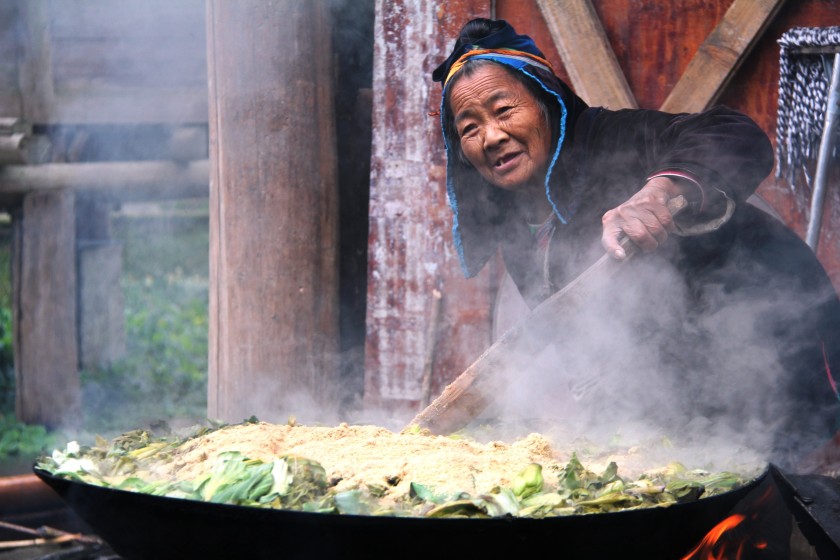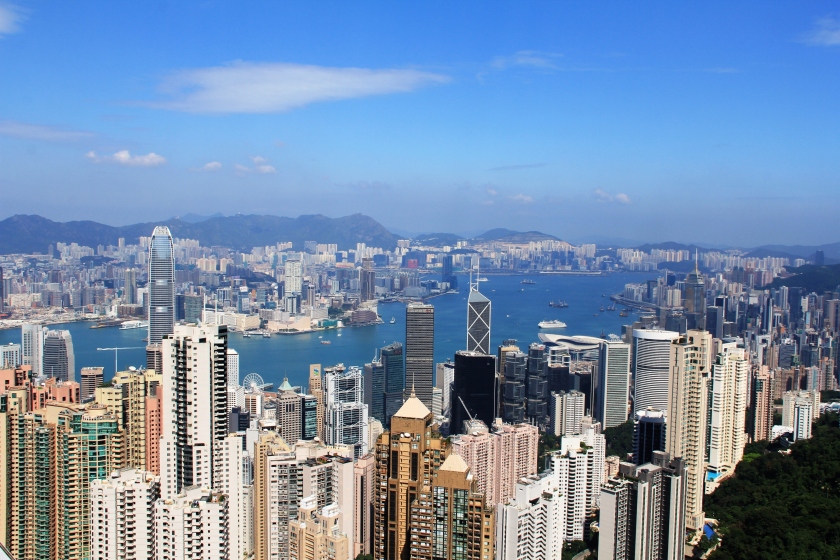
Ni chi le ma, a Chinese greeting for hello, translates as “have you eaten?” Xiao Xiao told us. According to Wikipedia and other sources, as many as 30 million perished during Chairman Mao’s Great Leap Forward (1958-1961) which led to the Great Famine. Another 1.5 million died during the Cultural Revolution (1966-1976). Starvation was the cause of many of those deaths too, hence the greeting.

Xiao Xiao, 32, was our guide on a trip in China’s Guizhou province in October. “My generation realizes that Chairman Mao was just a man who made mistakes. The Cultural Revolution was a big mistake,’’ he said. During our bus rides, our enthusiastic leader filled us in on many more fascinating facts about this country of 1.38 billion. In teaming cities of towering skyscrapers, multi-lane roads, shiny cars, neon lights, Starbucks, 7-11s and McDonalds, it is hard to imagine those dreadful years. China is speeding into the future with gusto.
Our trip to China came to an abrupt and tragic end on day three of an 18-day visit. I stepped on a wooden footbridge, which appeared new, with the intent of taking a photo from the middle. The first plank broke in two. I plunged into a canal of raging water. Broken collar bone. Drowned camera. End of trip. Details in next post.

In Guiyang, the province capital, we stayed in the luxurious five-star, 300 room Renaissance hotel located at a bustling intersection which had been nothing but a field a few years ago. Guiyang’s population has surged rapidly, from 1.8 million to 4.8 million today. We traveled on a 300-kilometer long super highway with 50 plus tunnels that had been built in just four years. We stopped at clean, gleaming rest stops with upscale shops. We rode the state of the art bullet train, which tops France’s TGV.

Guizhou, in southwest China, is the poorest of China’s 23 provinces. It is mountainous, with few international tourists, but home to 49 different nationalities. There are 56 different nationalities in China, we learned.
While life in China’s cities with modern conveniences seems good, out in the countryside it may not be so rosy. Some 40 percent of the Chinese live in rural areas and earn their living from agriculture. More and more are moving to the cities which offer greater opportunity. Many leave their children behind with their parents. Because the country is so vast, they may only see their children once or twice per year.

It was in a tiny rural village where I had my accident. Huanggang is charming, quaint, primitive, and full of photo opps (my downfall). The previous day we had visited two popular tourist sites. Huanggoshu Waterfall (Yellow Fruit Tree Waterfall) is located in a

lush, green park. It is a beauty, but the best part is the footpath through a cave just behind the falling water. You walk along, often bent over, following the narrow passage with the curtain of water on your right. It is awesome, as is the Dragon Palace, a limestone water cave visited by boat. The cave is illuminated by bright spotlights in bold colors making for a surrealistic experience.
Before joining the Guizhou trip, Bob and I spent an afternoon in Shanghai, population 24.1 million with lots of impressive skyscrapers glowing in multi colored spotlights by night. The Chinese obviously love colored lights.

Our hotel, the Astor House, was just adjacent to the Bund, a broad riverfront promenade where folks stroll, hang out and take photos. This is the place where brides come with photographers, often a photo crew, to be photographed against the skyline. The sky was gray, but dozens of young lovelies in white posed for the perfect shot.

During our ambling we were approached by a friendly trio who spoke perfect English. They asked us to take their photo, bombarded us with all sorts of questions, were complimentary (“Bob looks so cool….You are so professional.”) The two young women, Fei Fei and Fan Fan, from a smaller city, were visiting their male cousin, Oscar, 31, who works in Shanghai—or so they told us. They were off to visit a traditional Chinese tea ceremony and insisted we join. We were hesitant, but had nothing special to do. A way to mingle with the locals, I figured.

The tea ceremony was in a tiny room in a nondescript building. There were no signs advertising this tourist special. “No photos in honor of Buddha,” the tea hostess explained. We were served different kinds of tea in minuscule cups, each having a special health benefit. “Drink slow. Relax,” we were told. Our bubbly trio kept talking, but it started to seem a bit strange, so we said we had to leave after sampling just two of six different types of tea. The bill: 400 renmimbi ($61.50) for a few sips of tea. We had obviously been sucked into a tourist scam. I paid rather than cause a scene. It could have been much worse, and it was an amusing adventure.

At the time we had not realized how amazing it was that they spoke such perfect English. As our travels continued, from five-star hotels to hospitals and doctor offices in the capital city, we encountered virtually no English speakers. When looking for a restroom, often I used the word “toilet” assuming surely that would be understood. No luck.
Guide Xiao Xiao, whose English is excellent, said he is one of few in the region who speaks English. Even though English is one of three major subjects in the education system, along with math and Chinese, few seem to have mastered the language.

Our China travels started in Hong Kong where everything is overwhelming: Size (vast). Buildings (tall, gorgeous, everywhere). People (masses). Traffic (crazy). Shops (designer, trendy, and expensive).
I am glad we went, but I found it all a bit OTT. Our favorites: Ferry ride to Lamma Island, hike across the island followed by a fabulous seafood lunch; scenic bus ride to Stanley Market; swim in the hotel’s rooftop pool surrounded by stunning views. I was disappointed in Stanley Market – better bargains at markets in France and Italy. The views from Victoria Peak, a major Hong Kong attraction, are nice, but getting there (final ascent by escalator) is a trip through commercialism gone wild. At every escalator landing, and there are too many, shops galore, most selling tourist trash.

Mainland China is intriguing. We were devastated, depressed and extremely disappointed to have had to leave after just three days. More about the tragic end of the trip coming soon.
 Don’t miss it. If not already a Tales and Travel follower, sign up (upper right). Your address is kept private and never shared.
Don’t miss it. If not already a Tales and Travel follower, sign up (upper right). Your address is kept private and never shared.
Unfortunately there has been a setback with collar bone recovery. I am one-handed again, but will get back to recipes soon — with two hands I hope. I do not like typing with one hand.
HAPPY HAPPY 2017 TO TALESANDTRAVEL READERS. Wishing you fun and enriching adventure in the year before us. Thanks for following the blog.


This is not a happy story. It makes travel insurance sound like a smart investment. Sorry your trip was cut short. Hope you are mending.
LikeLiked by 1 person
Maybe we should have asked those “friendly folk” for an address so we could send them a post card or three as we travelled about their country. But had they given us one I doubt it would have been for real. Afraid we might come looking for them.
Love/b
LikeLiked by 1 person
Hi Shelley and thanks for the comment . Recovery has been painful and slow, but it could have been worse. Photos on the memory card were safe, unfortunately not the camera. Water was about waist deep. The Chinese and our travel agency showered us with much-needed and appreciated TLC after the disaster. Details soon.
LikeLike
Wow. That must have been really frightening. Especially to be injured in a remote village in another country. I hope you quickly recover from your setback.
You were smart to back up your photos so that all was not lost when your camera was destroyed. I usually dump my photos onto my iPad on a daily basis.
The waterfall photos were magnificent!
I’ll be watching for the details about your injury and the aftermath. I want to know how you got out of the raging water…was it deep…were you in pain…you have left us in suspense!
LikeLiked by 1 person
Interesting trip So sorry to hear about your Terrible accident. Elizabeth
Sent from my iPhone
>
LikeLiked by 1 person
Gorgeous photos and most interesting text-I’m so impressed by both considering how short your trip turned out to be. You are truly amazing!
LikeLiked by 1 person
Thank you, but you win top honor for “amazing” : gourmet cook extraordinaire, superb seamstress and gardener, landscape architect, carpenter (fence, deck, walk builder)…and no doubt much more. Awesome! Astonishing!
LikeLike
Well done, Leah: good reading. . .
Sent from my iPad
>
LikeLiked by 1 person
Thanks Len. Hope to see you in Germany in May,
LikeLike